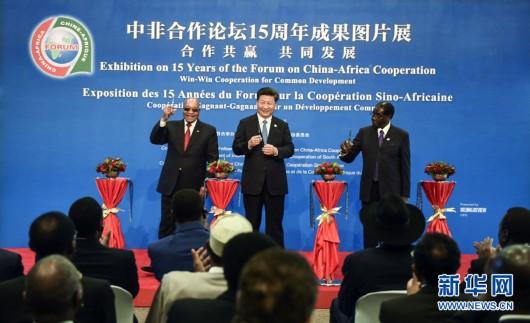

 |
| Chinese President Xi Jinping (center), South African President Jacob Zuma (left), Zimbabwe's President Robert Mugabe attend a photo exhibition on China-African Cooperation Summit in Johannesburg on Dec. 4, 2015. |
Since China launched its policy of reform and opening up, the rapid development of its economy has not only benefited its own people, but also boosted the global economy and delivered tangible benefits to the distant African continent.
According to the latest statistics, the China-Africa trade volume increased to $221.88 billion in 2014 from $10.8 billion in 2000. In 2009, China became the continent’s largest trading partner.
Chinese investment in Africa was less than $1 billion back in 2000, but the figure exceeded $100 billion last year, 100 times more in a decade or so.
After years of research, South African scholar Martin Davies believes the economic growth of China has driven the development in Africa since their growth patterns are generally consistent.
However, some Westerners fail to acknowledge China’s contribution to Africa’s development. Instead, they disseminate ideas about “China threats”, “neo-colonialism” and “China plundering Africa’s resources”.
A new fallacy emerged recently, claiming that the slowdown of China’s economic growth has affected the rising of Africa.
Regarding these, there is no need to make a fuss but just to sift through the facts.
First of all, these rumors contradict each other. When China imported a large amount of materials from Africa as part of its booming economic development in recent years, Westerners accused China of “colonizing” Africa and exploiting its resources. But now when China is slowing down its pace for the sake of economic restructuring, they blamed China for affecting Africa’s development.
Their own contradiction proves that the West recognizes China’s contribution, but still sees China through a colored lens. Certain western people have never changed their stance of undermining and defaming China.
Also, such ignorant accusations expose their lack of understanding of the African economy.
The current declining growth in Africa can be attributed to multiple factors. For external factors, the aftermath of global financial crisis still haunts the world economy. Africa suffers the most from the drop in prices of its raw materials .
What needs to be pointed out is that China is not a major export destination of raw materials for the whole African continent at large. In other words, the slowdown of China’s economy has had a limited effect on Africa.
Even though imports from Africa have fallen in monetary terms as growth for China’s 10-trillion-dollar GDP has slowed down to 6.9 percent, the quantity of these imports has not significantly dropped. Africa still benefits from the development of China.
As for internal factors, mono-product economic structure have checked African growth. Their population bonuses are yet to be realised. Take South Africa, the leading economy in the continent, as an example. Four reasons lie behind its sluggish economy.
To begin with, declining commodity prices exacerbated the domestic economy’s heavy reliance upon mineral exports including gold and iron ore. In addition, capital outflow started to emerge as the U.S. raised its interest rates.
Besides, arising labor strikes led to a rise in labor costs in South Africa. In the meantime, weakening currency and inflation in the country have bruised the confidence of investors.
China is a staunch supporter, as well as a sincere partner of and active participator in Africa’s development. At the Forum on China-Africa Cooperation Summit in Johannesburg, Chinese President Xi Jinping announced ten major plans to boost bilateral cooperation.
All these projects will help Africa accelerate its industrialization, enhance the construction of infrastructure and strengthen its capability of independent development so that the continent’s economy can shake off external influences and address root causes as soon as possible to realize long-term and stable development.
China-Africa cooperation, which always upholds the principle of win-win results, will ultimately benefit Africa and its people.
This article is edited and translated from 非洲仍是中國發(fā)展的受益者 Source: People's Daily Overseas Edition.
The author is Deputy Editor-in-Chief of Social Sciences at China Press and an expert on African studies.
 Have you ever taken these beautiful subways in China?
Have you ever taken these beautiful subways in China? Chinese beauties, foreign models meet in Chengdu
Chinese beauties, foreign models meet in Chengdu Awesome! Aerial pictures taken on J-11 fighter
Awesome! Aerial pictures taken on J-11 fighter A foreign girl explains what China should be proud of
A foreign girl explains what China should be proud of Chinese navy's air-cushioned landing craft in pictures
Chinese navy's air-cushioned landing craft in pictures Chinese pole dancing master opens class in Tianjin
Chinese pole dancing master opens class in Tianjin Splendid Sichuan after snow
Splendid Sichuan after snow College girl of Vancouver crowned Miss Chinese Int'l 2016
College girl of Vancouver crowned Miss Chinese Int'l 2016 Pentagonal Mart becomes the largest vacant building in Shanghai
Pentagonal Mart becomes the largest vacant building in Shanghai Top 20 hottest women in the world in 2014
Top 20 hottest women in the world in 2014 Top 10 hardest languages to learn
Top 10 hardest languages to learn 10 Chinese female stars with most beautiful faces
10 Chinese female stars with most beautiful faces China’s Top 10 Unique Bridges, Highways and Roads
China’s Top 10 Unique Bridges, Highways and Roads Buying nianhuo!
Buying nianhuo! What Chinese try to sneak on flights (and how)
What Chinese try to sneak on flights (and how) Northeast authorities vow they will work to eradicate GM grains
Northeast authorities vow they will work to eradicate GM grains China’s richest village manages to transition away from old industries
China’s richest village manages to transition away from old industriesDay|Week